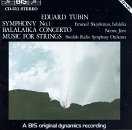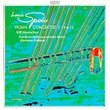| All Artists: Ola Karlsson, Bernt Lysell, Bjorn Sjogren, Emanuil Sheynkman, The Swedish Radio Symphony Orchestra Title: Eduard Tubin: Symphony No. 1 in C minor (1931-34) / Concerto for Balalaika & Orchestra (1964) / Music for Strings (1962-63) - Neeme Järvi / The Swedish National Radio Symphony Orchestra Members Wishing: 0 Total Copies: 0 Label: Bis Release Date: 3/25/1994 Album Type: Import Genre: Classical Styles: Chamber Music, Forms & Genres, Concertos, Historical Periods, Modern, 20th, & 21st Century, Symphonies Number of Discs: 1 SwapaCD Credits: 1 UPCs: 750582017223, 7318590003510 |
Search - Ola Karlsson, Bernt Lysell, Bjorn Sjogren :: Eduard Tubin: Symphony No. 1 in C minor (1931-34) / Concerto for Balalaika & Orchestra (1964) / Music for Strings (1962-63) - Neeme Järvi / The Swedish National Radio Symphony Orchestra
CD DetailsSimilar CDs |
CD ReviewsOutstanding performnaces of Tubin's expressive works. David A. Hollingsworth | Washington, DC USA | 09/06/1999 (5 out of 5 stars) "Every time I hear the Symphony no. 1 in C Minor (1931-1934), I think of the First Symphony of Sir William Walton or even the First Symphony of Sir Arnold Bax. The work, written by the 29 year old Eduard Tubin (1905-1982), is a daring, ultimately moving, and an expressive piece with little restraints in most places. The thematic ideas are fresh and mature and when hearing the piece, I must wonder why this recording of the work is currently the only one in existence and why the work in not in a more diverse repetoire.The Concerto for Balalaika and Orchestra (1964) is one of the few known pieces written for that wonderful instrument. Glazunov composed the Fantasy for Balalaika & Orchestra by 1903 whereas Serge Vasilenko had written the Concerto for Balalaika & Orchestra by 1929. Tubin's concerto does not have the eastern slavonic accent of Vasilenko's, but it maintained the modern, somewhat cosmopolitan communicative idiom. The passages for the balalaika are demanding in places while reflective & calm in others. Overall, the piece is appealing & the soloist Emanuil Sheynkman played with warmth & command.Music for Strings (1962-1963) is also cosmopolitan & progressive in it's communication. The first movement is laid-back whereas the Allegro is virtuosic & active. It is only by the Adagio (finale) where peaceful reflection has the last, effective saying.Neemi Jarvi has proven himself the champion interpreter & the key advocate in representing the works of Tubin, that Slavonic/Nordic great Estonian composer. The Swedish Radio Symphony Orchestra played with great responsiveness, passion, excitement, and vividness (personally, that orchestra outshined, though slightly, the Bamberg & Gothenburg Symphony Orchestras in performing Tubin's work in an otherwise excellent BIS recording series featuring the composer). Should I hope that more of Tubin's music be freshly performed & recorded. This BIS compact disc is highly recommendable, although it is slighly costly. Invest nevertheless. You will not regret it." Excellent, but with a few reservations... Richard A. Cavalla | NJ, USA | 04/30/2000 (4 out of 5 stars) "There is an old saying that it takes two people to create a great painting. The painter, obviously, but also someone with a gun to shoot the painter before they overdo it! A bit extreme, but it does reflect how, with inexperience, an artist can tend to put "too much" into a work and not realize that less can be more. These thoughts could be applied to Tubin's 1st Symphony from the early 1930s. It is a powerful work, with lots of great ideas, but it never quite comes together smoothly. The orchestration is a bit too thick, the melodic lines do not distinquish themselves, and there is not enough variety of tempo and rhythm. Nevertheless, even a work that is mediocre by Tubin standards is still good by mere mortal standards. You will want to hear this symphony, but Tubin wrote better symphonies that you might prefer to start with. The Balalaika Concerto, from 1964, shows Tubin's mature talent for orchestration. The ideas are clearer and more memorable, the orchestral writing cleaner and more varied. My only reservation is the choice of solo instrument. The balalaika is a Russian instrument that lies somewhere between a guitar and a mandolin. It adds an exotic, unique touch to the music, but it is also a bit one-dimensional. I just do not think the balalaika can adequately portray the lyricism and emotion that is so central to Tubin's art. Check out this piece for the rich orchestral contribution, not the solo instrument. The final piece on the disc, Music for Strings, is the best work here. In fact, it is one of Tubin's best works and probably one of the best works of the 20th Century for string orchestration. It is in three movements, with a unique order of Moderato-Allegro-Adagio that Tubin makes work perfectly. Each movement is superb, culminating in the beautiful, heartfelt Adagio. Recommended for Tubin fans. If you are not a fan of Tubin, pick up one of Neeme Jarvi's other Tubin discs on BIS and become a fan!" Tubin's Symphony No. 1 Is A Masterpiece J. Rich | 10/31/2009 (4 out of 5 stars) "Eduard Tubin is one of those composers that have "fallen between the cracks" so to speak. The only advocate for his music has been Jarvi, although there was a cycle of Tubin's symphonies released on the Alba label that appeared years later after Jarvi's cycle. Jarvi proved that Tubin's music had staying power and I have to agree it does. I do not like everything Tubin wrote, especially his later symphonies, but even they have some merit. I consider Tubin's 1st symphony to be his masterpiece.
Other than the Jarvi recording of the 1st, the only other one available is on the Alba label, so this recording is my only reference and what a reference it is! Jarvi and the Swedish Radio Symphony Orchestra play with fire and Jarvi's sensitive conducting is exactly what the doctor ordered. The first movement will leave you breathless! It's almost a miniature masterpiece all by itself. The other pieces on this recording "Concerto for Balalaika" and "Music for Strings" aren't that special. My problem with this concerto is that I don't think the balalaika is a lead instrument at all. It sounds out-of-place and I found myself becoming increasingly bored with the lack of range the instrument has. The other piece "Music for Strings" is a much better piece and has a neo-classical sound. It's a pretty decent piece of music much better than the concerto. If there's one disc to pickup in Jarvi's Tubin cycle, let it be this one. The 1st really deserves to be in the standard repertoire. Again, I'm not huge fan of Tubin's music (yet), but the 1st is just outstanding. Overall 4 1/2 stars." |


 Track Listings (9) - Disc #1
Track Listings (9) - Disc #1